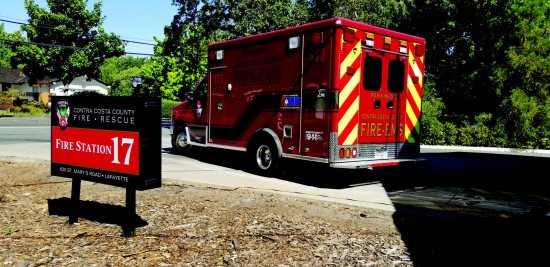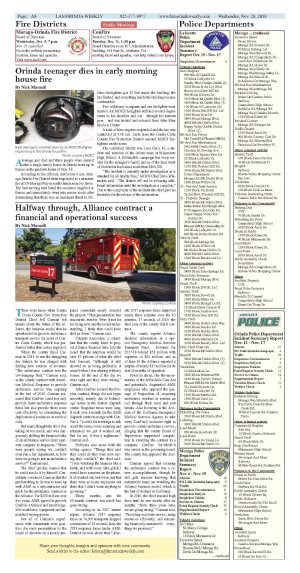| | Published November 28th, 2018
| Halfway through, Alliance contract a financial and operational success
| | | By Nick Marnell |  | | Photo courtesy ConFire |
There were times when Contra Costa County Fire Protection District Chief Jeff Carman felt unsure about the future of the Alliance, the business model that he spearheaded to provide ambulance transport service for most of Contra Costa County, which has performed better than critics expected.
 When the county hired Carman in 2013 to run the struggling fire district, he was charged with finding new sources of revenue. "The ambulance contract was the low-hanging fruit," Carman said, as the county contract with American Medical Response to provide ambulance service was expiring at the end of 2015. Carman reasoned that ConFire could not only provide faster ambulance response times but also provide them more cost effectively by eliminating the duplication of resources on medical calls.
When the county hired Carman in 2013 to run the struggling fire district, he was charged with finding new sources of revenue. "The ambulance contract was the low-hanging fruit," Carman said, as the county contract with American Medical Response to provide ambulance service was expiring at the end of 2015. Carman reasoned that ConFire could not only provide faster ambulance response times but also provide them more cost effectively by eliminating the duplication of resources on medical calls.
 But many thought the chief was taking on too much, and was dangerously shifting the financial risks of an ambulance service from a private company to taxpayers. "There were people saying we couldn't even run a fire department, so how were we going to run an ambulance service?" Carman said.
But many thought the chief was taking on too much, and was dangerously shifting the financial risks of an ambulance service from a private company to taxpayers. "There were people saying we couldn't even run a fire department, so how were we going to run an ambulance service?" Carman said.
 The chief quickly learned that he could not do it by himself. Consultants convinced Carman that the prudent thing to do was to team up with AMR as a subcontractor and pitch for the ambulance contract as the Alliance. For $200 million over five years, AMR agreed to provide ConFire a trained and knowledgeable workforce, equipment and unmatched buying power.
The chief quickly learned that he could not do it by himself. Consultants convinced Carman that the prudent thing to do was to team up with AMR as a subcontractor and pitch for the ambulance contract as the Alliance. For $200 million over five years, AMR agreed to provide ConFire a trained and knowledgeable workforce, equipment and unmatched buying power.
 Not all of Carman's experiences with consultants were positive. An early presentation to the board of directors by a poorly prepared consultant nearly derailed the project. "That presentation was inaccurate, terrible. Were it not for me being new and the board understanding, I think that could have shot us down," Carman said.
Not all of Carman's experiences with consultants were positive. An early presentation to the board of directors by a poorly prepared consultant nearly derailed the project. "That presentation was inaccurate, terrible. Were it not for me being new and the board understanding, I think that could have shot us down," Carman said.
 Citygate Associates, a consultant that the county hired to project Alliance financial data, told the board that the numbers would be only 10 percent of what the chief had forecast. "Although it still showed us as being profitable, it wasn't what I was sharing with my bosses. At the end of the day we were right and they were wrong," Carman said.
Citygate Associates, a consultant that the county hired to project Alliance financial data, told the board that the numbers would be only 10 percent of what the chief had forecast. "Although it still showed us as being profitable, it wasn't what I was sharing with my bosses. At the end of the day we were right and they were wrong," Carman said.
 After ConFire secured the five-year contract, things did not begin smoothly, mainly due to technology issues in the district dispatch center. Response times were long. It took over a month for the AMR dispatch center to merge with ConFire's. "I called for meetings to talk about the issues every morning and ultimately we got it worked out. But for me, it was a nightmare," Carman said.
After ConFire secured the five-year contract, things did not begin smoothly, mainly due to technology issues in the district dispatch center. Response times were long. It took over a month for the AMR dispatch center to merge with ConFire's. "I called for meetings to talk about the issues every morning and ultimately we got it worked out. But for me, it was a nightmare," Carman said.
 Problems also arose with the billing agency. "Things they said they could do they were now saying they couldn't," the chief said. "I was watching the finances like a hawk, and with every little glitch I would have someone on the phone. It all worked out, but it was just that there were so many naysayers out there that I didn't want anything to go wrong."
Problems also arose with the billing agency. "Things they said they could do they were now saying they couldn't," the chief said. "I was watching the finances like a hawk, and with every little glitch I would have someone on the phone. It all worked out, but it was just that there were so many naysayers out there that I didn't want anything to go wrong."
 Thirty months into the 60-month contract, not much has gone wrong.
Thirty months into the 60-month contract, not much has gone wrong.
 According to its 2017 annual report, Alliance 2017 response times on 74,000 transports dropped a minimum of 32 seconds from the 2015 response times under AMR. District records show that Lafayette 2017 response times improved nearly three minutes over the 10 minutes, 37 seconds of 2015, the final year of the county AMR contract.
According to its 2017 annual report, Alliance 2017 response times on 74,000 transports dropped a minimum of 32 seconds from the 2015 response times under AMR. District records show that Lafayette 2017 response times improved nearly three minutes over the 10 minutes, 37 seconds of 2015, the final year of the county AMR contract.
 The county reports Alliance financial information in a special Emergency Medical Services Transport Fund. Revenue for 2017-18 totaled $51 million with expenses of $44 million, and as of June 30 the Alliance reported a surplus of nearly $17 million for its first 30 months of operation.
The county reports Alliance financial information in a special Emergency Medical Services Transport Fund. Revenue for 2017-18 totaled $51 million with expenses of $44 million, and as of June 30 the Alliance reported a surplus of nearly $17 million for its first 30 months of operation.
 Perils lie ahead, like the uncertainties of the Affordable Care Act and potentially disgruntled AMR employees who opposed the passage of Proposition 11, requiring ambulance workers to remain on call through their meal and rest breaks. Also hovering is the decision of the California Emergency Medical Services Agency to take away ConFire's exclusive right to provide county ambulance service, alleging that the county Board of Supervisors suppressed competition in awarding the contract to a company - ConFire - for which it also serves as the governing board. The county has appealed the decision.
Perils lie ahead, like the uncertainties of the Affordable Care Act and potentially disgruntled AMR employees who opposed the passage of Proposition 11, requiring ambulance workers to remain on call through their meal and rest breaks. Also hovering is the decision of the California Emergency Medical Services Agency to take away ConFire's exclusive right to provide county ambulance service, alleging that the county Board of Supervisors suppressed competition in awarding the contract to a company - ConFire - for which it also serves as the governing board. The county has appealed the decision.
 Carman agreed that securing the ambulance contract was a career accomplishment, though he still gets nervous knowing that nationwide many are watching the Alliance business model, which is the first of its kind in California.
Carman agreed that securing the ambulance contract was a career accomplishment, though he still gets nervous knowing that nationwide many are watching the Alliance business model, which is the first of its kind in California.
 In 2016, the chief resisted high fives until he saw results after six months. "Now, three years later, we are going strong," Carman said. "Providing excellent service, using resources efficiently, and remaining financially sustainable - everything we promised."
In 2016, the chief resisted high fives until he saw results after six months. "Now, three years later, we are going strong," Carman said. "Providing excellent service, using resources efficiently, and remaining financially sustainable - everything we promised."

|
| | | | | | | | | | | | |



